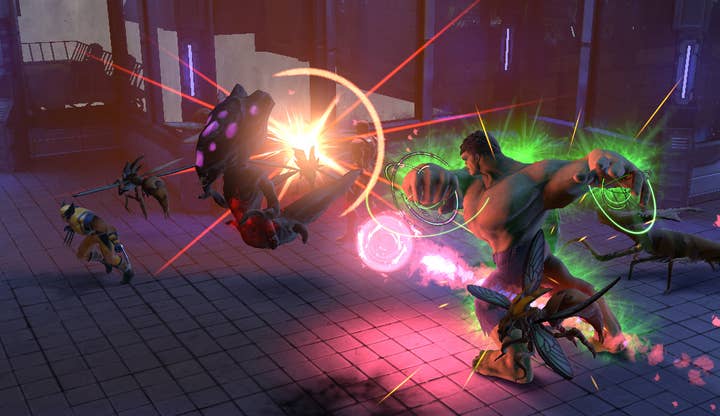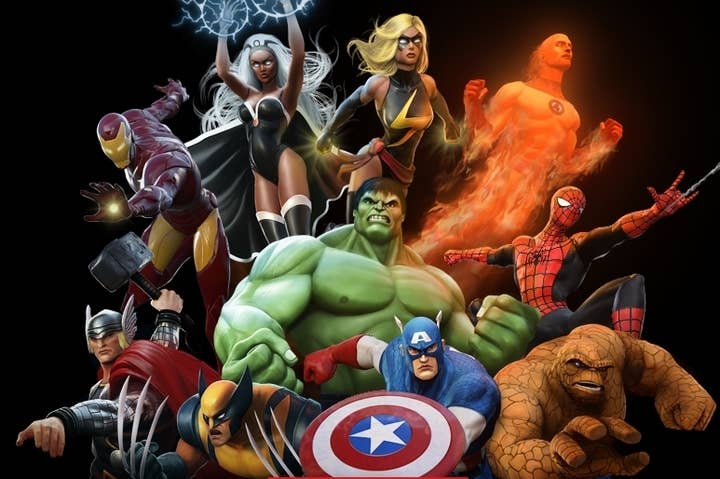David Brevik: Fun And Profit In Marvel Heroes
Is the Marvel license a ticket to free-to-play success? Gazillion Entertainment is about to find out
For Gazillion Entertainment, the launch conditions for Marvel Heroes are about as close to a 'best case scenario' as one could wish.
The studio signed a 10-year deal to develop games based on Marvel IP back in March 2009. At that point, Marvel's ascent to the very pinnacle of mass pop-culture was certainly under way, largely thanks to a solid trilogy of Spider-Man films from Sam Raimi and, in 2008, the breakout success of Iron Man. Looking back now, it was really just the beginning: last year, Joss Whedon's The Avengers took $1.5 billion worldwide, and Iron Man 3 has so far taken almost $1.2 billion. Box-office takings keep going up, and there are more films coming.
Frankly, the public interest in the Marvel character portfolio has never been higher, and David Brevik, president and COO of Gazillion, is only too happy to acknowledge his good fortune.
"This is a business, and so you have to balance how generous you are with the ability to make money and pay your employees"
"We've been fortunate," he says. "It was a little bit of a happy accident. Nobody could have predicted that it was going to do what it was going to do. It's impossible to predict that sort of success.
"The license has a lot of advantages anyway, but Marvel IP is at an all-time high. That brings a lot of attention and enthusiasm from a rabid fanbase that has never been larger. Even if your exposure is just from the movies, having a lot of those characters in the game will bring people in."
And Marvel Heroes has been built to sustain those people. Indeed, it's fair to say that its approach to free-to-play monetisation practically demands them. When the opportunity to create an MMO based on the Marvel universe arose four-years ago, Brevik was never likely to follow the crowd down the same road as World of Warcraft - a road that has yielded few rewards for those that have tried. Instead, he wanted to bring a little of his most famous game, Diablo, to the table: fast, fun, accessible, deep and - thanks to the sweeping changes in the MMO market in the last few years - free.

While Brevik and his team at Gazillion have crafted and refined their game, the free-to-play model has endured an extended period of occasionally painful growth. There have been big winners and big losers, but for Brevik the lessons from that period all point towards an approach that embraces generosity. In Marvel Heroes, every item but for a handful of pre-sale incentives will be available for free through random loot-drops or as rewards for making progress. There will be no time-gates or skill bottlenecks; just a game good enough to make players want to spend their money, and attract enough of them to make the economics work.
"Great design of a free-to-play game, I think, can put the monetisation and the gameplay side-by-side without really requiring each other"
"Some people are harsher about it than others," says Brevik. "Some make no bones about it: 'You're gonna level at quarter of the rate in order for us to make money.' You have to pay to play a real game they've crippled it so much. We don't feel we've done that. You get a great experience, and then the ability to monetise on top of that.
"This is a business, and so you have to balance how generous you are with the ability to make money and pay your employees to continue working on the game. It's a delicate balance, but we hope that erring on the side of generosity we hope will pay off in the end - that people will appreciate that and recognise that."
In a recent interview with GamesIndustry International, the legendary game designer Sid Meier spoke of his discomfort with building micro-transactions into Ace Patrol, his first attempt at a free-to-play game. "Building monetisation into your game design is not a totally comfortable thing," Meier said. "We really don't want to get into a situation where the two are in conflict, where to make my game more fun I would do this and to make my game earn more money I have to do this."

All too often, though, that's exactly how free-to-play games feel to the player: unreasonable difficulty spikes, laborious tasks and rewards withheld, all of which can be bypassed by reaching for your wallet. Brevik believes that needn't be the case, and points to GungHo Entertainment's all-conquering Puzzle & Dragons as an example of how to do it right.
"Puzzle & Dragons is making $3.75 million a day, and they're mostly making it from this random machine, where you pull the lever and out comes a monster"
"It's making $3.75 million a day, and they're mostly making it from this random machine, where you pull the lever and out comes a monster," he says. "I don't really feel like that gets in the way of the gameplay at all. You don't require the monsters that come out of that machine to have success in the game. It's just a very enticing diversion. Great design of a free-to-play game, I think, can put the monetisation and the gameplay side-by-side without really requiring each other."
For Brevik, the key currency in Puzzle & Dragons, League Of Legends and, if all goes according to plan, Marvel Heroes is enthusiasm. Fortunately, the Marvel license comes complete with a store of more than 70 years of enthusiasm, for a range of characters and products across a variety of media. Gazillion doesn't need to get people excited about Wolverine or Iron man; it just needs to make them fun to play.
"I think it's really about the quality of the entertainment," says Brevik. "If you're going to make a great movie like The Avengers, it's going to do well. You're adding the rabid fanbase on top of that. That's what we're trying to focus on here: making a great action-RPG-MMO, and adding the Marvel license on top of that. It could bring our success to a huge level."

